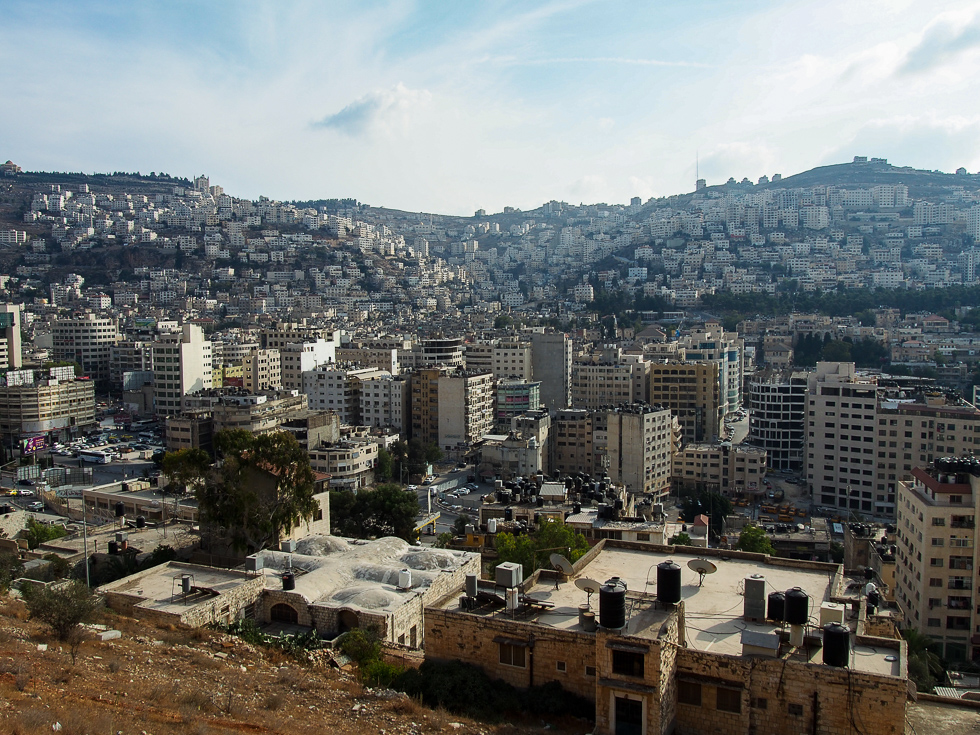
Hillside homes in the sprawl of Nablus, Palestine
I had two questions when contemplating solo female travel in Palestine: 1) Is it possible? and 2) Can I really just go, or do I need to go as part of a tour group? Turns out, solo female travel in Palestine was a lot easier than I thought it would be! (And no, tour groups are great but not necessary to visit Palestine). I traveled for one week in the West Bank, sola the whole time. I felt safe and didn’t have any problems, allowing me to really dive in to the language, culture, and politics of the region. Traveling in Palestine is a deeply rewarding, challenging, and eye-opening experience, which I highly recommend. To aid you, whether a solo female traveler or anyone looking for more information about traveling in this complex region, here is my complete guide to everything you need to know about travel in Palestine.
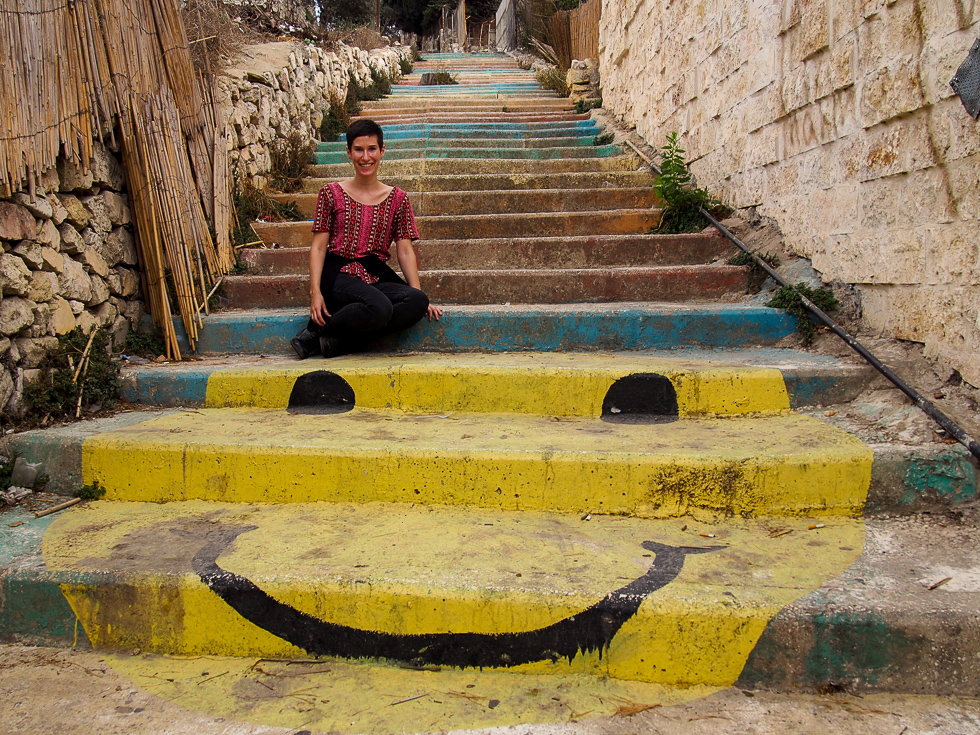
Finding happiness in my sola travels around Ramallah, Palestine
Note: this post may contain affiliate links. If you make a purchase through one of these links, I will earn a commission at no extra cost to you.
Know before you go
Palestinians in the West Bank and Gaza are under military occupation by Israel, meaning that every aspect of their lives are under the control of the Israeli military. This restricts basic movement and freedoms, limits access to resources, and generally makes day to day life challenging for the Palestinians. The occupation, as well as the history of the conflict between Israel and Palestine, is complex and is not easy to understand after just a brief trip to the region. I recommend learning a bit about the background of the situation before traveling, as it means less to process on the ground (and even so, there will be plenty to process on the ground).
Here is a short video that gets into the history of the conflict. Here is a source about the history of Zionism. Here is a Q&A about Israeli settlements in the West Bank.
Also, I would recommend checking out the following books, which go much more in-depth about the conflict:
- The Battle For Justice In Palestine by Ali Abunimah, a primer on the conflict
- The Idea Of Israel: A History Of Power And Knowledge by Ilan Pappe, which looks at Zionism in the founding and existence of Israel
- The Israel Lobby And U.S. Foreign Policy by John J. Mearsheimer and Stephen M. Walt, which gets into U.S. foreign policy and support of Israel, and how that shapes politics in the Middle East
- I Shall Not Hate by Izzeldin Abuelaish, a memoir by a Gazan doctor, for those looking to learn more about the situation in Gaza
Finally, I want to point out that traveling in an area experiencing military occupation is not easy. It is emotional, thought-provoking, and tiring to be exposed to vast amounts of injustice and human suffering. That being said, I believe that it is important for travelers to see the occupation firsthand and to speak with Palestinians about their lived experiences. Furthermore, travel in Palestine allows us to confront and rewrite the many mixed narratives that we outsiders receive related to the conflict, to Palestinians, and to Arabs as a whole.
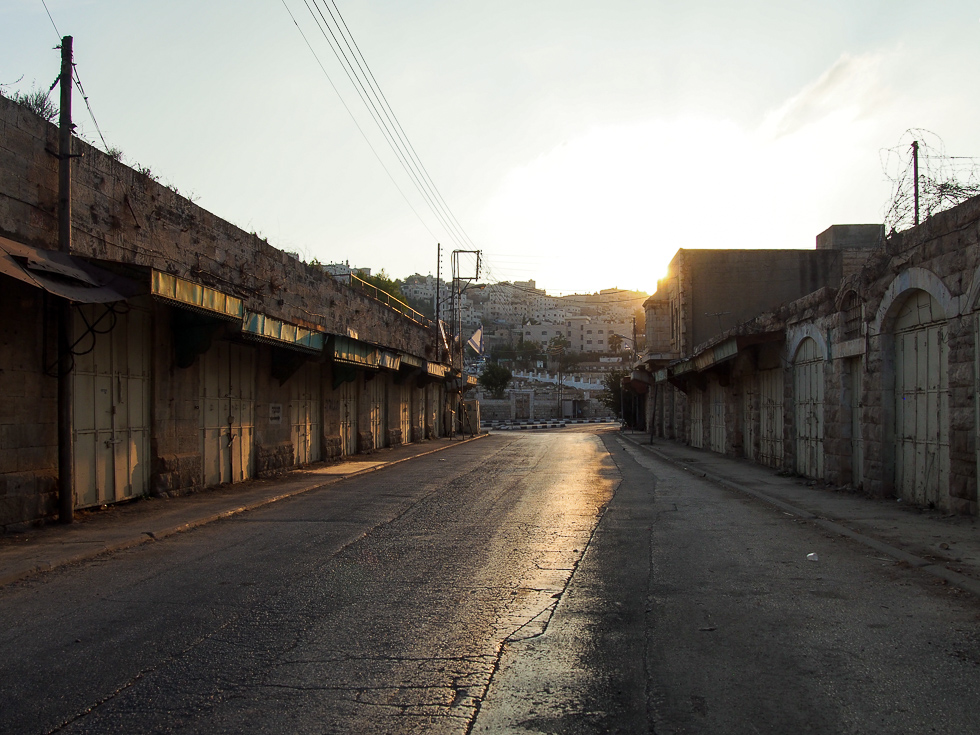
Haunting view of Al Shuhada Street in Hebron, Palestine. This street, formerly the economic heart of the old city of Hebron, has been closed to Palestinians since the early 2000s.
Places to visit in Palestine
Palestine, according to the border established in 1967, consists of two discontiguous land masses: the West Bank and the Gaza Strip. People cannot travel to Gaza without special permission from the Israeli government, and this permission is generally only granted to journalists or members of aid organizations. However, travel in the West Bank is absolutely feasible, and I strongly encourage folks visiting Israel to visit the West Bank as well. There is so much to see and do, and I was surprised by how easy it was to travel throughout the West Bank.
Popular places to visit in the West Bank are Bethlehem, Ramallah, Jericho, Nablus, Hebron, and the Dead Sea, though there are many, many other sites and cities to visit as well. I made it to Ramallah, Bethlehem, Nablus, and Hebron during my trip and recommend all of them. I found that Ramallah and Bethlehem were good places to use as bases to travel other parts of the West Bank; for example, I did a day trip from Ramallah to Nablus, and another day trip from Bethlehem to Hebron. I also spent a day hiking in the north of the West Bank, as a day trip from Ramallah. Finally, I want to note that even though the West Bank is small, there is so much to see, so allow yourself time there! After one week I felt that I only scratched the surface.
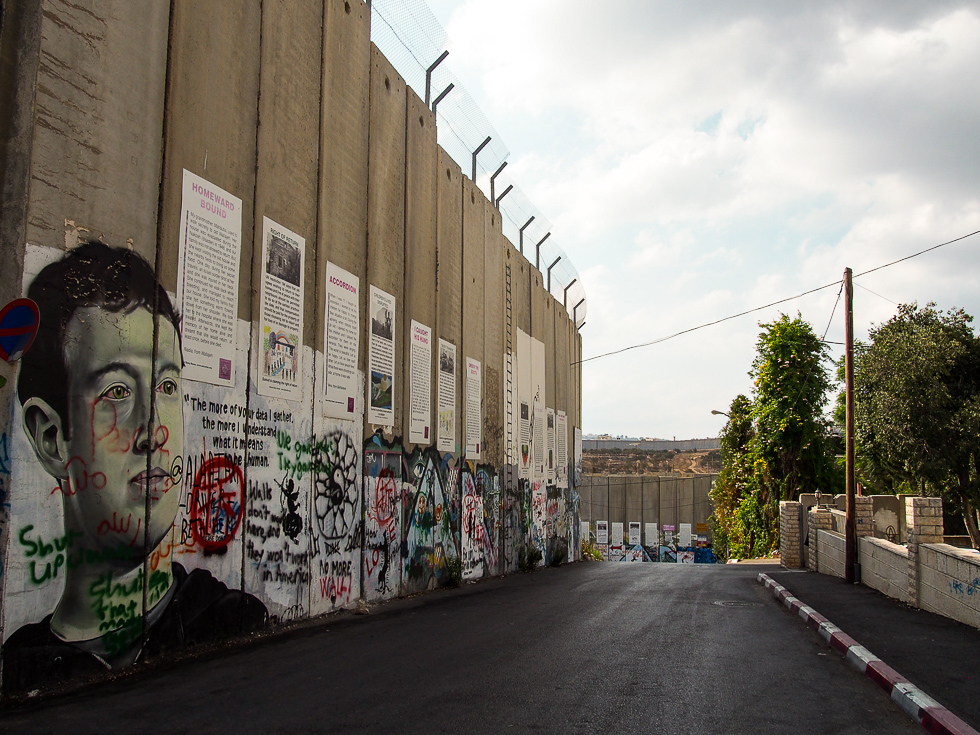
A section of the separation wall that runs throughout the West Bank (also known as the apartheid wall), seen nearby Bethlehem, Palestine. The wall is currently over 400 kilometers long, dividing communities throughout the West Bank.
Safety and the solo female traveler
Overall, I felt safe as a solo female traveler in Palestine. But there are a lot of misconceptions about solo female travel in general, and particularly when it comes to travel in the Middle East/North Africa (MENA) region, so I think this warrants a brief discussion.
When I was planning my trip, friends and family members actively discouraged me from visiting Palestine, and particularly from going alone. One well-meaning friend actually told me, “Do not go there. You’re going to get kidnapped!” So first, I want to recognize where these fears are coming from, because I tend to get at least one kidnapping comment every time I’m planning a trip to the Middle East. There are a lot of misconceptions about what life and travel are like in the Middle East, especially because western media provides us a very one-sided view of the region. Our news cycles portray the MENA region as inherently violent, anti-western, and a breeding ground for terrorism. The Middle East is also shown as a black hole of patriarchy and homophobia. And with propaganda like this, why wouldn’t people be concerned about travel there?
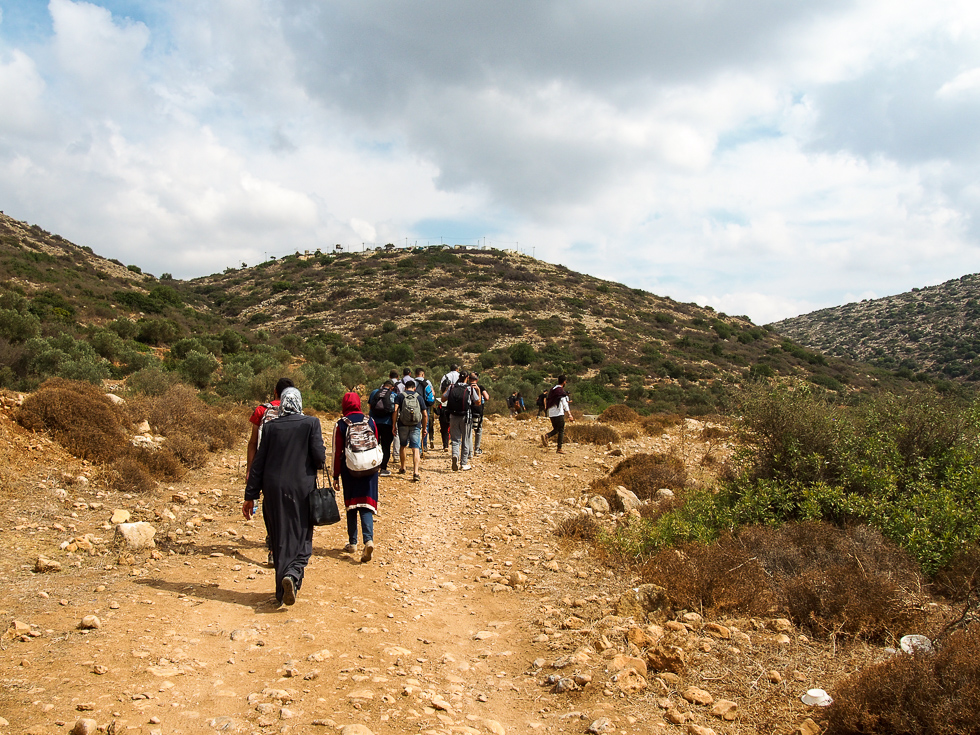
What the media would never share with you: a group of Palestinian hikers who spend the day enjoying nature in the West Bank’s Wadi Qana
However, what western media fails to portray about Palestine, and about the MENA region as a whole, is that real humans live there, most of whom are just like you and me: trying to make it in this world, and subject to the same experiences of joy, pain, and hope that we all feel. And while travelers should absolutely pay attention to political instability in the places we visit, I believe that it’s important to separate fact from fiction when we discuss travel safety. Although Palestine is under military occupation, generally any political conflicts that occur are between settlers/the Israeli army and Palestinians, not between foreigners and Palestinians. In general, I found Palestinians to be incredibly friendly and welcoming to me as a foreigner: they were happy to speak with me, to hear about my country and culture, and to share their experiences of life in Palestine. My general impression was that Palestinians encouraged tourism, as it allows outsiders to see the reality of the situation there and subsequently share their observations.
I will mention two occupation-related safety concerns, however. One is that it’s a good rule of thumb to avoid protests, as that is where one would be most susceptible to violent clashes between the Israeli army and the Palestinians. And the other is specifically for Jewish travelers in the West Bank. Yes, it is possible to travel in Palestine while Jewish, and there are plenty of people who do it. However, be aware that certain Jewish symbols could mistake you for a settler.
Specifically regarding solo female travel in Palestine… women should anticipate some street harassment, namely catcalls, attempts at conversation, and staring. In general, it is very common in the Arab world for men to intensely stare at you as you pass them on the street, and Palestine is no exception. Some women feel more comfortable wearing sunglasses on the street to avoid eye contact, but I personally have never done this. Sometimes I make eye contact with men on the street and it has never caused problems for me (in Palestine or elsewhere in the Middle East). Although generally street harassment is a huge problem (both in Palestine and everywhere in the world), I did not feel particularly threatened or vulnerable, and in fact I felt safer in Palestine as a solo female traveler than in other, more touristic countries that I have visited.
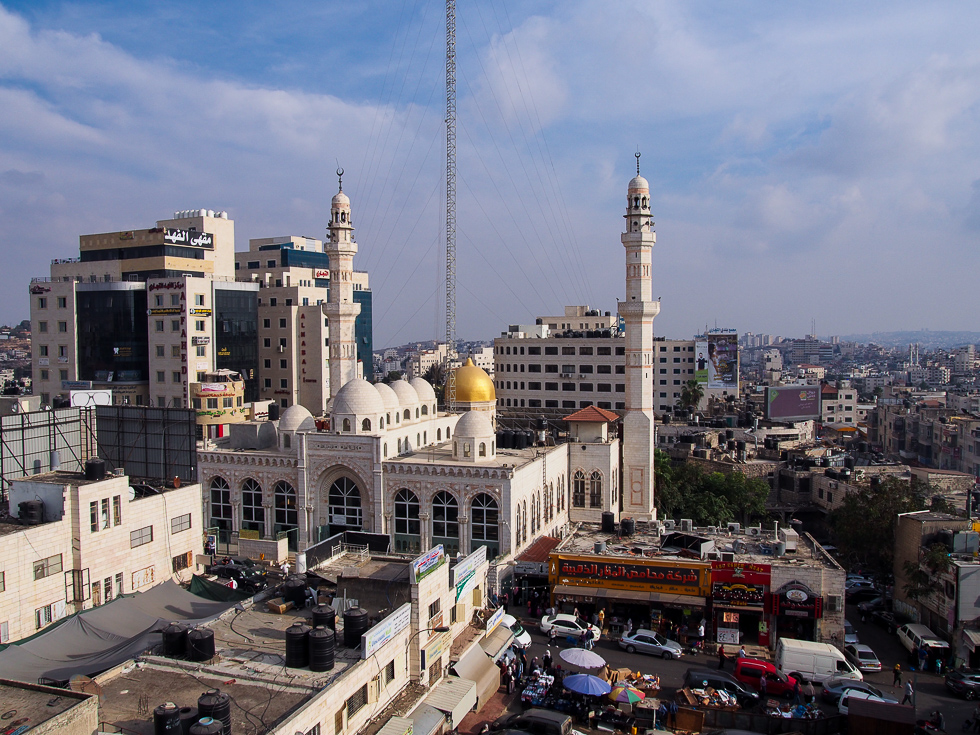
The view from my hostel room in Ramallah, Palestine – beautiful, no?
What to wear while traveling in Palestine
Clothing is an important consideration for solo female travelers in Palestine, and in any Arab country. I recommend dressing “conservatively”, which for me meant long pants and tee-shirts, mostly. Many Palestinian women dress in long pants or skirts, long-sleeved shirts, and hijabs, for reference. I would avoid shorts, crop tops, and tank tops. Note that Hebron is more conservative than other big cities in Palestine, such as Ramallah, Bethlehem, and Nablus. While it may be frustrating to modify your appearance, I believe that it’s important to be respectful of the local culture when traveling, which includes abiding by the dress code.
Finally, I want to note that there is no need for female travelers to cover their hair while traveling in Palestine. In fact, many Palestinian women do not wear the hijab. The only time female travelers are expected to cover their hair is when visiting mosques (and most mosques will provide a hood or other hair covering for use during your visit).
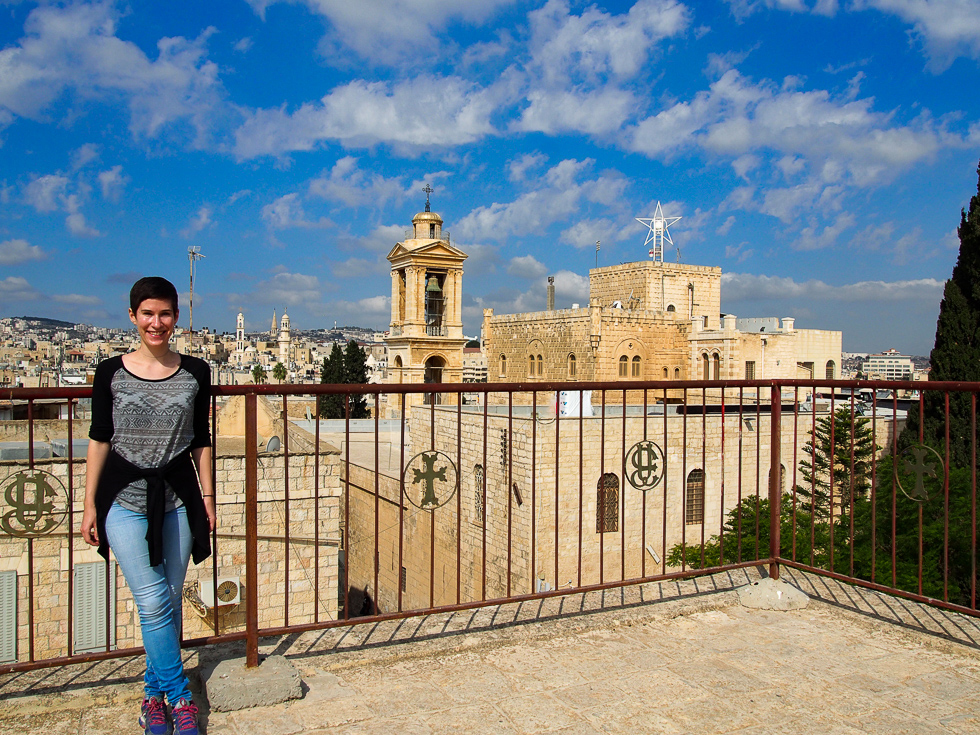
A typical outfit for me in Palestine, worn in Bethlehem!
Currency and travel costs in Palestine
The currency in Palestine is the shekel (the same as in Israel). Note that the 10-cent coins used in Israel are not accepted in Palestine; the smallest denomination accepted is the half-shekel coin. I found that travel in Palestine was comparatively cheaper than in Israel. A bed in a hostel dorm room was about a third of the cost of a dorm in Tel Aviv or West Jerusalem. I also found food and water to be a fraction of the cost.
Getting to, from, and around the West Bank
Navigating the West Bank was easier than I thought it would be. There are plenty of buses, including big coach buses and small (generally seven-person capacity) buses called services. Coach buses cost about 7 shekels. Service buses are slightly more expensive (they are faster and more direct, though you have to wait for them to fill up before they leave). The service bus that I took from Ramallah to Nablus cost me 16 shekels. Buses run until the evening, though service stops around 7 or 8 p.m. I didn’t take any taxis in Palestine so I can’t speak to the taxi cost, but they are readily available in all Palestinian cities.
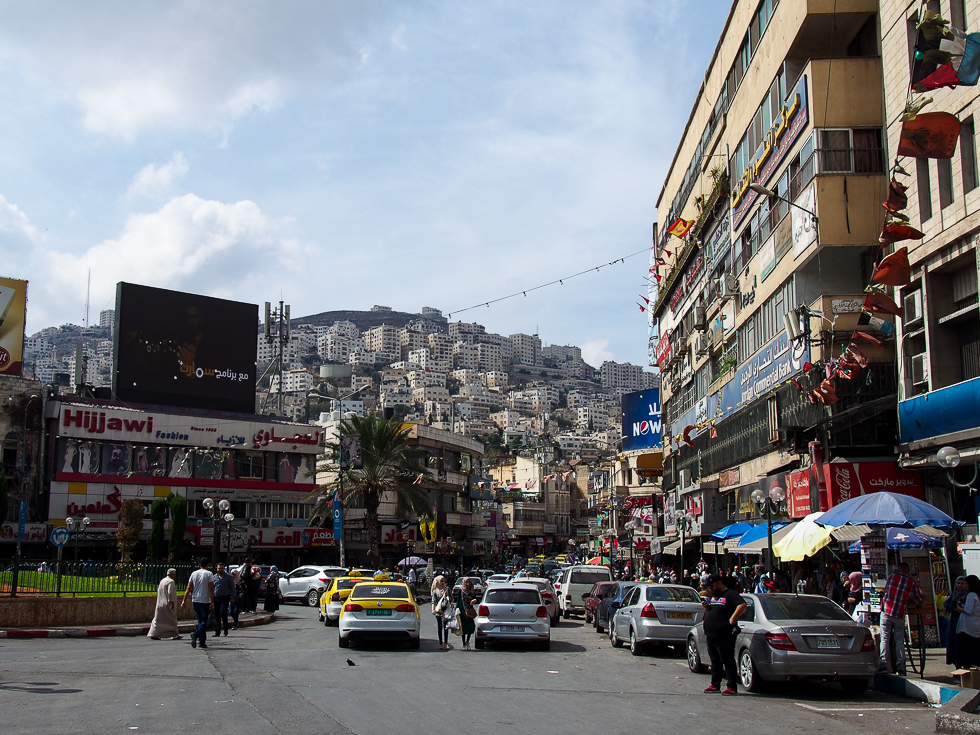
Taxis and more in the new city of Nablus, Palestine
To get to the West Bank from Jerusalem, head to Damascus Gate. Near Damascus Gate, there are multiple bus stations. The westernmost bus station is where the buses leave for Bethlehem. One block east is another bus station, where the buses leave for Ramallah. Feel free to ask anyone on the street if you have trouble finding the right bus, and people will happily point you in the right direction. Travel from Damascus Gate to Ramallah and Bethlehem takes about 1 hour, sometimes longer depending on traffic.
You can also travel between the West Bank and Jordan, via the Allenby Bridge border crossing. This is the most direct way to travel between Palestine and Amman, Jordan. The border crossing is located near Jericho, Palestine.
Navigating checkpoints in Palestine
There are many checkpoints throughout the West Bank, so you should always carry your passport with you, as well as your Israeli visa, which you will need to pass through. The biggest checkpoint is Qalandia Checkpoint, located between Jerusalem and Ramallah.
I passed through Qalandia Checkpoint multiple times without incident, though be mindful that there is always traffic, so plan accordingly. The minimum travel time between Ramallah and Jerusalem is about 1 hour, though it can easily take longer. It is more time consuming to return to Jerusalem than it is to leave Jerusalem; for example, on one journey from Ramallah to Jerusalem it took over two hours, because there was so much traffic around the checkpoint (note that these cities are only 8 miles apart). You will not necessarily have to get off of the bus to pass through this checkpoint; listen for direction or ask fellow passengers as you arrive to Qalandia.
Language
Palestinians speak Arabic, specifically the Palestinian dialect of Arabic, which is similar to the Arabic spoken in Jordan, Lebanon, and Syria. Knowing some basic Arabic words and phrases is helpful when navigating Palestine (and will also result in many Palestinians being super excited about the fact that you’re trying to learn). However, many people speak English as well, so the language barrier should not be a huge concern. Finally, most Palestinians do not speak Hebrew, but out of respect for the political situation I would opt for Arabic and English over Hebrew regardless.
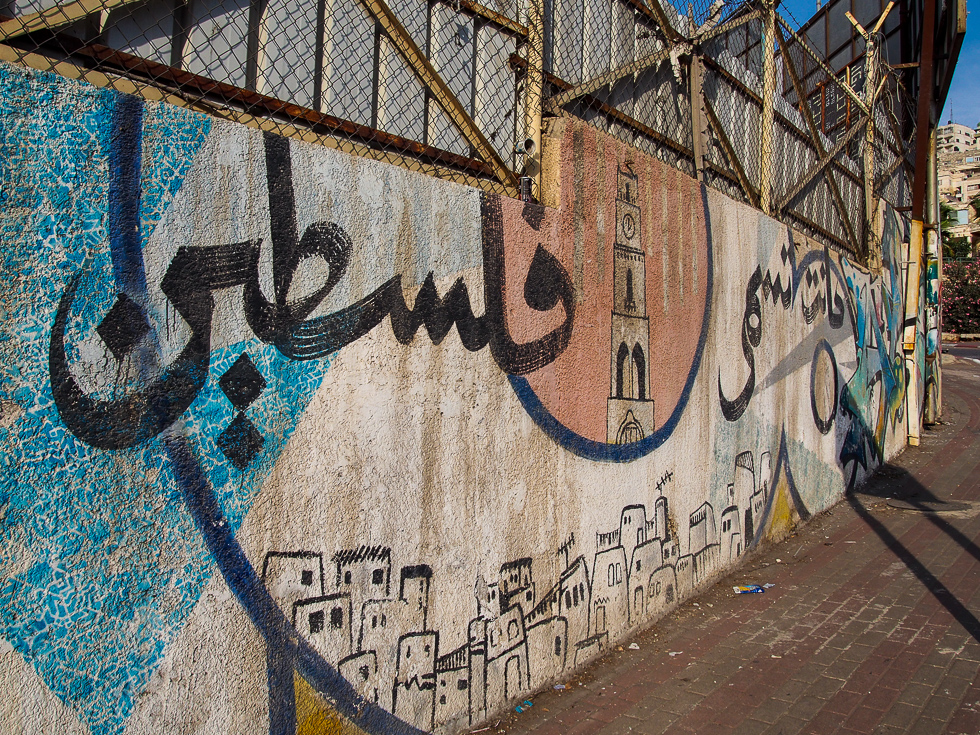
It’s really helpful to know even a little bit of Arabic when traveling in Palestine. Plus, it means you get to read the street art! Do you know what this word means? (Hint: it says “Palestine”)
Water in Palestine
The tap water in Palestine is supposedly safe, and I met many tourists who drank the tap water without incident. Some choose to boil the tap water before drinking, and others stuck to bottled water. I drank the tap water for about two days before switching to bottled water. I have a sensitive stomach and felt a little ill; perhaps it had nothing to do with the water but I decided not to take my chances. I recommend you use your judgement with respect to the tap water, and listen to your body.
Otherwise, be mindful that water is a huge point of contention in Palestine. The major aquifers in the West Bank are controlled by Israel, resulting in a disproportionate allotment of water which either leaves the West Bank entirely, or is reserved for settlers. As a traveler in the West Bank, please be mindful of your water usage, and do your best to take shorter showers and turn off the tap while brushing your teeth, etc.
Other important things to know about travel in Palestine
So many things! But off the top of my head…
I found this very jarring at first, but get used to walking in the middle of the street, in traffic. In Ramallah especially, it’s very common to just walk in the middle of a major intersection or a traffic circle. The cars should stop – still, be careful.
Also note that Palestinians are highly politicized. Everyone has a political opinion, and politics are par for the course in conversation. It is okay to ask people’s political views, and to ask questions about the conflict. But be mindful and ask permission before sharing or documenting the views of Palestinians, who face the risk of being jailed for critiquing the government.
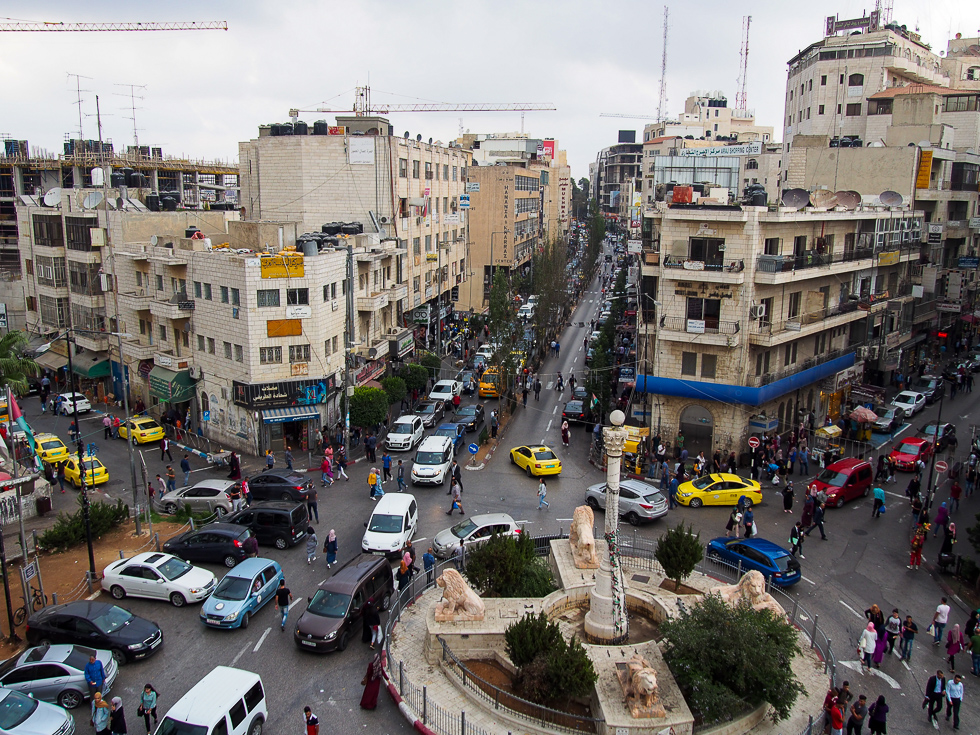
See all of the people walking in the street? You’ll get used to it. Snapshot of the city center in Ramallah, Palestine.
For folks traveling with their partner(s) (or for those who find a Palestinian sweetie during travel!), be aware that Palestine is a conservative, Muslim country. It is not culturally accepted to show any sort of public displays of affection in the streets.
Also, a note on LGBTQIA+ rights in Palestine. Queerness is legal in the West Bank but culturally taboo (in Gaza, however, it is illegal). However, there are plenty of LGBTQIA+ folks in Palestine, and Ramallah is meant to have a very active (but very underground) queer scene. For more information on LGBTQIA+ rights in Palestine, see this resource.
The food in Palestine is excellent. Try mansaf, and definitely don’t miss the knafeh (especially if you make it to Nablus). Also, beer drinkers should try Taybeh beer, made in a brewery just outside of Ramallah. Also note that “cocktails” in Palestine refer to ice cream sundaes.
Finally, travelers should expect to encounter lots of Palestinian hospitality. People are really, really welcoming, and they are particularly excited to meet and converse with foreigners. I met many Palestinians who, after just a short conversation, invited me to their homes to share a meal with their families. I was treated to many cups of tea and coffee. Some vendors and shopkeepers will refuse to let you pay for a meal. This is common and cultural. Practice gratitude always.
All in all, Palestine is a beautiful and complicated place, and so worthy of being on your travel bucket list. Happy travels.
Is Palestine on your travel bucket list? What are your main concerns as a solo female traveler, anywhere in the world? Do you have any other questions about traveling in Palestine? What has been your favorite destination for solo female travel? Let me know in the comments below!
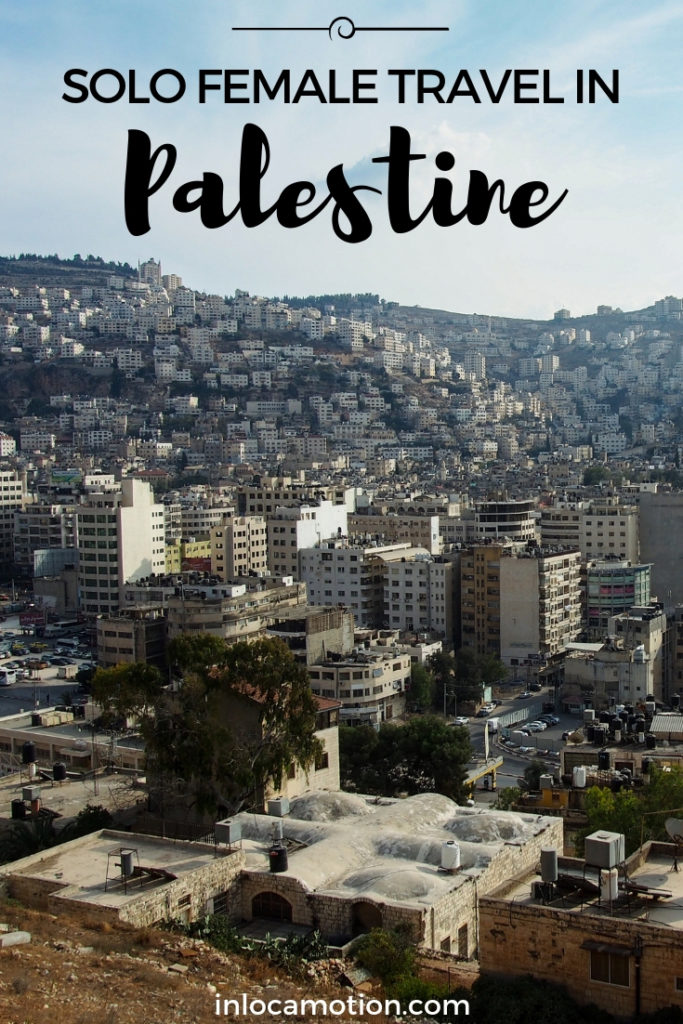









29 comments
The world get better by leaarning new things. Thanks for sharing them.
Glad you found it useful!
Love your adventurous spirit! I’m very interested in visiting Palestine, but I don’t know that I’d do it solo. This was such an interesting read. And walking in the middle of the street? Who would have known!
I know, the walking in the street was one of the most jarring things! And people were soooo deliberate about it, like they would move off of the sidewalk to walk in the street. It was such a random bit of culture shock! haha. Otherwise, I appreciate your positive feedback, and I’m glad to hear that you’re interested in visiting Palestine. Solo or not, it’s very worth it 🙂 Thanks for reading and commenting, Rebecca!
I loved your reflection in this piece, especially how you encouraged everyone to expand their depths to learn about others. My absolute favorite sentence, ” It is emotional, thought-provoking, and tiring to be exposed to vast amounts of injustice and human suffering.” You’re a great writer – thanks for sharing your experiences. The photos are also amazin.g
Crystal, thank you so much for the positive feedback and the words of encouragement. I think it’s so important to take on this deep reflection of our travels, especially when we come back and share our stories and thoughts to family and friends. Not everyone can travel, and not everyone would travel to Palestine, but hopefully through my writing I can help expand some of the narrow-minded thinking that folks in the west tend to have around the topic. Anyway, I’m so glad that you found the post useful. Thanks for reading and commenting 🙂
This is exactly the type of blog post we need, thank you for opening up Palestine to your readers and sharing the beauty of what you found.
Thank you so much, Monique! I’m glad that you found it useful, and thank you this positive feedback 🙂
Great post! Palestine is definitely one place you don’t hear a lot about as a travel destination or what it’s like there. And, I love how you take the time to try to tear down those old stereotypes of the area. Glad to hear that they are very receptive to foreigners. Thank you for sharing!
Thank you! Yeah, it’s not exactly hot on the tourist trail (most folks just assume that you can’t travel there, or worse, straight up asked me “why would you WANT to travel there?” without realizing that in spite of the conflict, it’s a functioning society!). I really appreciate your positive feedback, April. Thank you for reading and commenting!
Thank you for this really comprehensive and informative post. It really covers everything we need to know for a trip to Palestine. I have been to Israel, but unfortunately didn’t make it to Palestine. But it looks really interesting and maybe I will make it there one day!
Thanks for the positive feedback, Elisabeth. I hope you can make it there at some point! 🙂
Wow, what an inspirational post. I am very pro-Palestine and interested in the Middle Eastern political and cultural sphere in general. I’m so happy that you decided to be brave, travel there and share your experiences. Made me definitely want to go there myself, meet some Palestinians, see how they lead their lives and experience their hospitality.
Definitely if you’re into the politics and cultures of the MENA region, then Palestine has a LOT to offer. It’s impossible not to think/talk about politics there. I hope that you get the chance to go at some point and experience it for yourself, and have many interesting and challenging discussions as well. Thanks for reading and commenting, Anna 🙂
This is such a detailed guide and I hope that one day I can follow in your footsteps. I had planned to go last year but after reading about a South African Muslim female traveller being detained for 24 hrs then sent back without any valid reason I decided to go to Malaysia and Singapore instead.
Hi Razena. Thank you for reading and commenting, and for sharing this perspective. I think it’s very valid that you decided not to go based on this traveler’s experience – there is unfortunately more targeting and racial profiling for Muslim travelers, and it’s so awful. If you do decide to go at some point, I hope that you have a peaceful trip with no issues. Best of luck and thank you for sharing your thoughts.
You addressed all of my worries I would have about travelling as a solo female in Palestine. I’ve never travelled to the Middle East but it sounds like it is a really eye-opening experience. Thanks for sharing your experiences in Palestine and things to consider if you visit
I’m glad to hear that you found it useful! Honestly, I love traveling in the Middle East – it’s one of my favorite regions in the world and I always have incredible experiences traveling there. I hope that if you go at some point that you’ll have similarly positive experiences! Thank you for reading and commenting, Brianna 🙂
Wow, genuinely inspiring, a great perspective and guide! It’s not a common travel destination and to let alone travel there solo is inspirational! I would love to travel to Palestine someday, thank you for sharing your story and for encouraging others to do the same!
Thanks, Monica! Really appreciate your positive feedback 🙂 I hope that you can make it there at some point and that you enjoy it immensely!
This is such a helpful and well thought out guide to Palestinian travel – I’m sure it’s going to be a great help to many female travellers in the region 🙂 I’ve often considered what it would be like to visit Palestine, and many of my concerns have been about whether it’s relatively safe to do so solo. I’m really glad you’ve assuaged that worry for me!
I’m so glad that you found the guide helpful! Best of luck in your travels, and hopefully if you make it to Palestine you thoroughly enjoy it 🙂 Thanks for reading and commenting, Flora.
Looking back I wish I had visited Palestine when I went to Israel, and now I will have to go especially after reading this post of yours! I loved all the perspectives you’ve gained from traveling there and I definitely wish I’d done more research prior to visiting Israel so research about the politics is definitely important. Thank you for sharing!
Well, there’s always next time! I’m glad to hear that you found my post useful, maybe next trip to the Middle East you can make a pitstop in Palestine! Thanks for reading and commenting, Constance 🙂
Greetings! Very helpful advice within this article!
It’s the little changes that make the most significant changes.
Thanks a lot for sharing!
Thanks Elvira, I’m really glad that you found it helpful!
Thank you for your article. What did you do while you were in Ramallah?
Thank you for such a useful and insightful article! I’m planning a trip to Palestine in 2022 because I’ll be 60 and all kids out of the nest! I WANT to go solo. Can I rent a car and drive in/out of Palestine/Israel easy enough? Or am I better to find alternative transportation to place like the Dead Sea, Jericho, West Bank, Bethlehem? Thank you!
Found it so difficult to find good information on travelling in Palestine, thank you so much for writing this article. For others who are also looking for information, I also found this site really useful, especially for realistic/non-politicised safety recommendations and practical information about travel in the country. http://www.travelingpalestine.com/